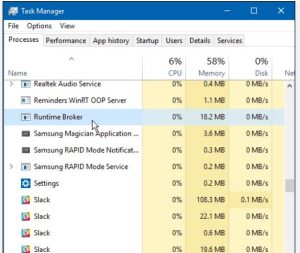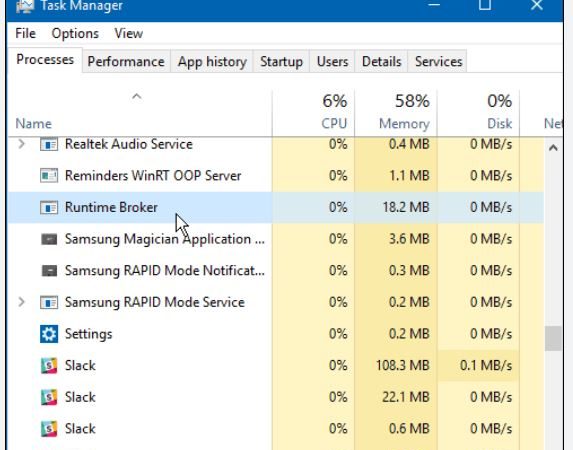What is runtimebroker.exe and What Does It Do?
RuntimeBroker.exe is a program that runs in Windows 8.1 and 10. It’s safe and does no harm to your PC. However, you might want to know what it is and why it’s running.
The reason RuntimeBroker.exe is running is because Microsoft introduced a feature called “Windows Update for Business.” With this update, businesses are able to schedule automatic software installations. For example, if you’re a small business owner, you could set up a scheduled task to install security patches every week. You’ll never see a notification pop up telling you about the installation; however, once it’s done, you won’t have to worry about it anymore.
This is where RuntimeBroker.exe comes into play. If the scheduled task fails, RuntimeBroker.exe will take over and complete the installation. If the scheduled task succeeds, RuntimeBroker.ex will notify you that everything went well.
So, while RuntimeBroker.exe isn’t harmful, it’s still something you should keep an eye out for. Once again, it’s just a tool that runs in the background and doesn’t do anything malicious.

What is RuntimeBroker.exe
The RuntimeBroker.exeis a core component of Windows8 and Windows 10. It helps manage running applications, whether they are already installed or you just downloaded them. It allows you to start, stop, pause, resume, restart, uninstall, update, repair, change settings, or check for updates for installed programs.
RuntimeBroker.exedoesn’t run without any application installed. It needs an app to work properly. If it finds no apps installed, it displays a warning screen about how to install one.
If you don’t want to see this warning screen, you can turn off “Show system information while installing”. You can also use the command prompt to force the RuntimeBroker.exeto run. Type the following into the command prompt:
%windir%\system32\rundll32.exe %SystemRoot%\SysWOW64\cpl.dll,RunOnce.
This tells the RuntimeBroker.exeto open up and run automatically whenever you log in. You’ll still see the warning screen, though.
#4 – What is RuntimeBroker.Exe?
Could This Process Be a Virus?
There is no shortage of malicious software out there, including viruses, spyware, adware, trojans, rootkits, keyloggers, worms, dialers, bots, ransomware, malware, scareware, rogue anti-malware applications, fake antivirus apps, fake security apps, fake antimalware apps, etc. And it seems like every day we hear about another one of these threats being discovered. But what about those seemingly innocent looking processes that you see running in the background on your PC? These processes might seem harmless enough, but could they actually pose some threat to your privacy or even damage your device? Let’s take a look at some examples of these processes and find out whether they are really safe or not.
Memory Leaks
Microsoft is aware of memory leak issues affecting some devices running Windows 10 Mobile. These include Lumia 950/XL, Nokia 7 plus and Nokia 5.1 Plus. Microsoft says it is investigating the matter and is working on a fix.
The issue affects all versions of Windows 8.1 and Windows 10 Mobile. A spokesperson told TechCrunch that there is no workaround for now.
Why Is It Using Memory?
Universal Applications are designed to work across multiple devices and platforms. They are built to run on Android smartphones, tablets, PCs, TV sets, smart watches, and even cars. These apps use less resources than traditional desktop applications because they don’t require a separate installation process. However, some apps do consume more memory than others. Here are three reasons why an application might use more memory than expected:
1. Running background tasks
Apps running in the background can cause problems. For example, you might want to keep track of your fitness goals while doing something else. If you’re logged into Facebook, it could automatically start playing music in the background. This isn’t necessarily a problem; many people enjoy listening to music while working out. But if you’re trying to focus on your workout, having Facebook play music in the background could distract you.
2. App caching
When you download an app, it stores information about what you’ve done within the app itself. An app cache helps speed up your device by storing frequently used data locally. However, if you delete an app, it doesn’t clear away everything stored in the app cache. So if you uninstall an app, you might still see old versions of the app’s cached files.
3. Unnecessary permissions
Some apps ask for permission to access certain things like location, camera, microphone, contacts, and calendar. Some apps request this information just to make sure you’re allowed to use features in the app. Others use this information to provide additional functionality. For example, an app might use your location to show nearby businesses.
Why Is It Spiking My CPU Usage?
If you’re seeing spikes in CPU usage while browsing the web, there are several things you might want to try before calling tech support. Here are some common causes and how to fix them.
1. Apps running in the background.
Apps like Facebook Messenger, WhatsApp, Instagram, Twitter, and others run in the background even when you aren’t actively using them. This isn’t necessarily a problem unless those apps use up too much memory or processor power. 2. Malware.
Malicious software can cause your device to slow down over time. Some malware uses system resources without your knowledge, such as RAM, storage space, and processing power. Others take control of your phone remotely, making it difficult for you to do anything about it. To prevent malware from slowing down your device, make sure you keep your operating systems updated and scan your computer for viruses regularly.
3. Too many tabs open.
When you browse the internet, you usually have multiple browser windows open. Each one takes up memory and processor power, and if you have a lot of tabs open, your device could start feeling sluggish. Closing unused tabs and maximizing the window size of each tab you have open can help reduce the amount of memory used by your browser.
Can I Disable It?
The Broker is one of those things that you might want to disable because it slows down your app. But there are times where you really need it. So what do you do when you want to turn off the Broker?
You can’t turn it off completely, but you can make some changes to how it works. You’ll be able to control whether the Broker runs on startup or not, and you’ll be able to set up a timeout period for it to run.

Tim Wiley was a tech writer for seven years at Recode. In that time, he covered everything from basic browser.js and URL parameters to XHRs, performance, malware, security, enterprise apps, social media, and Windows secrets. He also written about how to hack Signal in 2016 and how to resist, or possibly even conquer, the zero-day threat.
